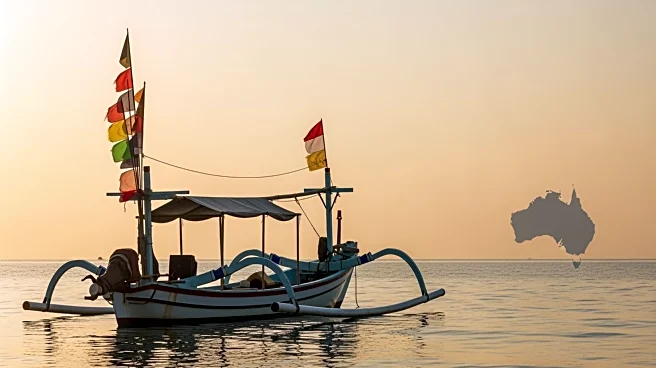What's Happening?
Six Indonesian nationals have pleaded guilty to illegal fishing activities in Australian waters, as reported by the Darwin Local Court on October 28, 2025. The incidents involved three separate cases where Indonesian vessels were intercepted by Australian authorities
near Cassini Island, Cape Bougainville, and Laseron Island in Western Australia. The Australian Border Force (ABF) seized significant quantities of sea cucumber, salt used for processing, and various fishing equipment from these vessels. The vessels were subsequently destroyed in accordance with Australian law. The masters of the vessels faced fines ranging from $7,000 to $10,000, while one master, identified as a repeat offender, received a 15-week prison sentence. The remaining crew members were fined $3,000 each. All fines are to be paid within 28 days, with imprisonment as a consequence for non-payment. The fishers will be deported to Indonesia after serving their sentences.
Why It's Important?
This case highlights ongoing issues of illegal fishing in Australian waters, which poses significant challenges to maritime security and environmental conservation. The prosecution of these individuals underscores Australia's commitment to enforcing its fisheries management laws and protecting its marine resources. The fines and deportation serve as a deterrent to future illegal fishing activities, aiming to preserve the ecological balance and sustain the fishing industry. The repeated offenses by some individuals indicate a need for stronger international cooperation and enforcement measures to prevent such activities. The case also reflects the broader geopolitical dynamics in the region, where maritime boundaries and resource management are critical issues.
What's Next?
Following these convictions, Australian authorities are likely to continue their vigilant monitoring of illegal fishing activities in their waters. The Australian Border Force and the Australian Fisheries Management Authority may enhance their patrols and surveillance operations to prevent further incidents. There may also be diplomatic discussions between Australia and Indonesia to address the root causes of illegal fishing and improve cooperation on maritime security. Additionally, the enforcement of fines and deportation could lead to increased awareness and compliance among foreign fishers operating near Australian waters.
Beyond the Headlines
The repeated illegal fishing incidents raise ethical and legal questions about the exploitation of marine resources and the responsibilities of nations to uphold international maritime laws. The destruction of vessels and deportation of fishers highlight the stringent measures taken by Australia to protect its marine environment. This case may prompt discussions on the need for sustainable fishing practices and the role of international agreements in regulating fishing activities. The long-term impact could include shifts in regional fishing policies and increased collaboration between countries to address illegal fishing.
















